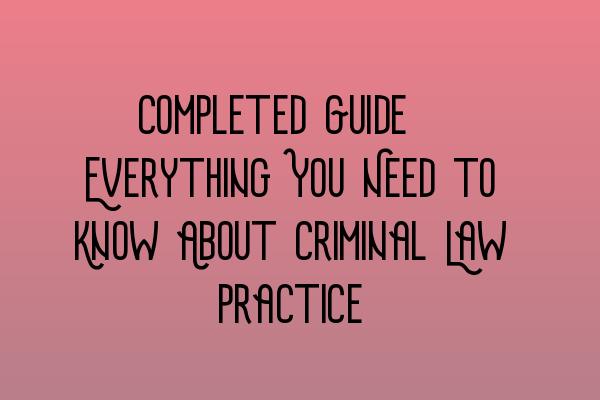Completed Guide: Everything You Need to Know About Criminal Law Practice
Welcome to SQE Criminal Law & Practice Law UK! In this comprehensive guide, we will provide you with all the information you need to know about criminal law practice. Whether you are a law student, a legal professional, or simply interested in understanding the intricacies of criminal law, this guide is for you.
What is Criminal Law Practice?
Criminal law practice involves the application of laws and statutes that define and regulate criminal offenses. It encompasses everything from initial investigation and arrest to trials and sentencing. Criminal law practitioners, including solicitors and barristers, specialize in representing and defending individuals accused of criminal offenses.
The Role of a Criminal Law Solicitor
A criminal law solicitor is a legal professional who provides expert advice and assistance to clients facing criminal charges. They play a crucial role in ensuring that individuals receive fair treatment within the criminal justice system.
As a criminal law solicitor, you will be involved in various aspects of the criminal law process, including:
- Providing legal advice and guidance to clients
- Investigating cases and gathering evidence
- Preparing legal documents and representing clients in court
- Negotiating settlements and plea bargains
It is important for criminal law solicitors to have a deep understanding of criminal law, as well as excellent communication and negotiation skills. They must also be able to handle high-pressure situations and work effectively under stressful circumstances.
Getting Started in Criminal Law Practice
If you aspire to become a criminal law solicitor, there are specific steps you need to follow:
- Educational Requirements: Obtain a law degree or a qualifying law degree. You can also consider pursuing additional qualifications such as the Solicitors Qualifying Examination (SQE) to enhance your prospects.
- Training Contract: Secure a training contract with a reputable law firm or legal organization. This will provide you with invaluable practical experience and mentorship.
- Professional Skills Course: Complete the Professional Skills Course (PSC) to develop the necessary skills required for practice as a solicitor.
- Admission to the Roll: Once you have completed your academic and professional training, you can apply for admission to the Solicitors Regulation Authority (SRA) to be admitted to the roll of solicitors.
Remember, it is important to stay updated with the latest laws, regulations, and case precedents related to criminal law practice. Continuous professional development and ongoing learning are essential to thrive in this field.
Preparation for SQE Examination
The Solicitors Qualifying Examination (SQE) is a new route to qualifying as a solicitor in England and Wales. To practice criminal law, it is essential to pass the SQE exams. Here are some articles that can assist you in your preparation:
- Visit this link for SQE 1 Practice Exam Questions to test your knowledge and understanding.
- Prepare yourself through SQE 1 Practice Mocks FLK1 FLK2 to familiarize yourself with the format and style of the SQE exams.
- For comprehensive SQE 2 Preparation Courses, explore our range of courses designed to equip you with the necessary skills and knowledge.
- If you are just starting your SQE journey, check out our SQE 1 Preparation Courses to lay a strong foundation for your studies.
- Stay informed about the latest SRA SQE Exam Dates to plan your preparation effectively.
By thoroughly preparing for the SQE exams, you can enhance your chances of success and build a solid foundation for a rewarding career in criminal law practice.
Conclusion
Criminal law practice is a dynamic and challenging field that requires a deep understanding of criminal law and excellent advocacy skills. By following the steps outlined in this guide and effectively preparing for the SQE exams, you can embark on a successful journey in criminal law practice.
If you have any further questions or need assistance with your legal career, do not hesitate to contact us. We are here to support you on your path to success.
